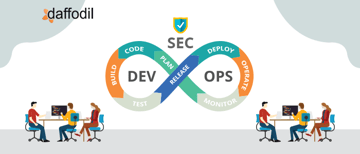
By 2024, low-code will be responsible for 65% of application development activities, according to Gartner. The pressure to deliver digital solutions in response to the COVID-19 pandemic has accelerated its adoption.
Since businesses made immediate transitions to the digital-only economy, there was a spike in new app development requirements. Low-code development technologies are thus catering to the developer crunch, accelerated delivery, and optimized cost for development.
Low-code development, which is a modular approach to software development aims at bringing agility to the delivery cycle. It is either executed through third-party platforms or a reusable components approach.
The low-code development platforms allow developers to drag-and-drop visual interfaces and build a full-fledged app. This allows the developers to focus on the core functionality of the solution, rather than spending time on repetitive tasks.
Another modular approach to development is by using reusable components. These components are nothing but a piece of code that is turned into a module. This module is further reused in creating different applications. To know more about how this approach works, visit our previous blog that shares the benefits of low-code development.
Low-code no-code development was a thing then and it is still a trend now. But what makes this software development approach more disruptive than ever? Let’s figure it out in the upcoming segment of this blog.
Low-Code Development: The ‘New Normal’ for Software Development
The software development industry gets updated with numerous tools, technologies, architectures, and methodologies to deal with the challenges associated with agility, scalability, and cost of development.
While native and hybrid app development is two of the robust modes of development, low-code or no-code has been gaining acceptance due to several reasons. Some of them include:
1. The COVID-19 Pandemic
Almost every business had a slowdown during the global pandemic, COVID-19. Understanding the consequences and dealing with them, many businesses digitized themselves, assuring that they reach out to their audience/customers in the best way possible.
The immediate rush to create software applications, for different purposes, at varying scales created the demand for a software development approach that could speed up the delivery cycle. That’s when the low-code or no-code development gained significant value.
By using low code development platforms or reusable components, developers were able to expedite the development. Moreover, this approach allowed developers to invest their technical skills and time in more logical tasks rather than working on repetitive tasks that can be automated.
2. Developer Drought
IT organizations are under continuous pressure to deliver innovative, scalable solutions. However, only a small group of top-tier organizations can manage to meet the market demand with traditional development methods. Most organizations are buried under technical debt and are struggling to hire potential staff.
By using the low-code development approach, software development firms can increase developer productivity and speed. The developers can create high-quality web and mobile solutions while trying their hands on new technology. The pre-built user interfaces, data models, easy integration of APIs ensure that even citizen developers can get started with product development.
According to Gartner, the growth of low-code development is driven by businesses asking IT to create more software. Thus, the rising demand for custom software in support of digital transformation has lead to the emergence of citizen developers outside of IT, which has influenced the rise of low-code/no-code development.
3. Best MVP Creator
In the hyper-competitive world, businesses want to be sure about their idea before their time and cost are invested in it. That is why it has become important to have confidence in a solution before executing it large scale. Minimum Viable Product (MVP) is one such mode to test the viability of the product.
MVP is the initial version of a product with a minimum but core features. It helps to check the market acceptability of the solution before a full-fledged, scalability solution is launched in the market. Low code development helps to design a product in the least time possible so that it can undergo a market-fit test.
ALSO READ: MVP vs Prototype Vs PoC: What’s the Best Approach to Measure Product/Market Fit?
4. Traditional Development vs Flexibility
Traditional approaches for development are rigid in terms of coding, syntax, logic. Nonetheless, they are one of the most prominent ways to build a strong, scalable, integrable software solution. On the other hand, low-code or no-code development approaches are flexible. There is no rigidity in terms of the development of language, logic, and other technicalities.
Low-code/No-code for Software Development
The terms low-code and no-code are used interchangeably. However, there is a thin line between them. Low-code development is a way for developers with varied skills to design applications with minimum hand-coding. For example, developers can create javascript reusable components using Angular or React and then keep using these components in different apps. We, at Daffodil, adopt this approach to reduce time-to-market and development costs.
On the contrary, no-code development is meant for people with a non-technical background, i.e. people outside the IT department who may not know programming languages. In short, no-code enable organizations to equip non-technical teams with tools that can help them to create software applications, without formal training.
While both approaches aim at speeding up the development cycle, they vary when it comes to concepts like scalability, interoperability, and technicality of solution. Amongst the two, opting for low-code development using reusable components is always a better idea as it a supporting role in building a scalable solution in the minimum time possible.
If you planning software development with a low-code or no-code approach, then connect with experts to understand how these modular approaches to building a product can help your business. Setting up a consultation session is free!



